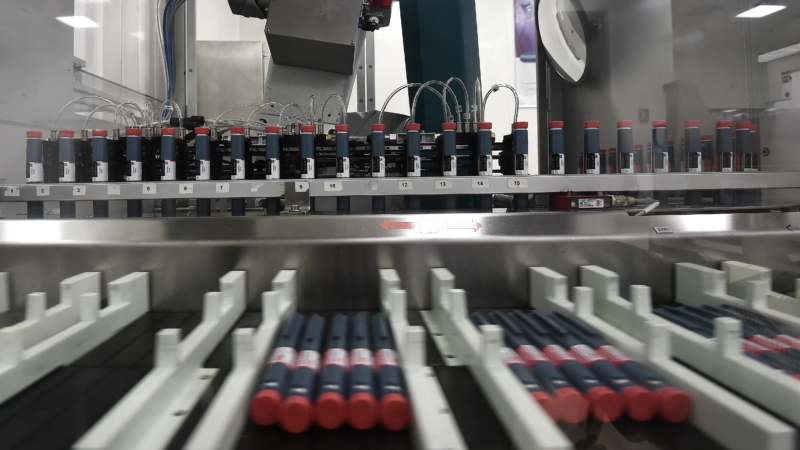FTC sues insulin middlemen, saying they pocket billions while patients face high costs
Millions of people with diabetes need insulin to survive. For years, many of them have been forced to pay exorbitant prices for a product that’s inexpensive to make. Now, the federal government is targeting one part of the system behind high insulin prices.
While out-of-pocket costs have gone down for many people to $35 a month, questions remain on how the drug became so expensive in the first place. In a new lawsuit filed Friday, the Federal Trade Commission said it’s going after one link in the chain: pharmacy benefit managers (PBMs).
The FTC brought action against the top PBMs — CVS Health’s Caremark Rx, Cigna’s Express Scripts, and United Health Group’s OptumRx — saying the companies created a “perverse drug rebate system” that artificially inflates the cost of insulin. If the suit is successful, it could further drive down costs for patients at the pharmacy counter.
PBMs are essentially the middlemen between drug manufacturers and insurance providers. Their job is to reduce drug prices. But the process is complex and opaque, and critics say they’re actually driving prices up for patients.
The FTC said a big issue is that PBMs’ revenue is tied to rebates and fees — which are based on a percentage of a drug’s list price. Essentially, in the case of insulin, when the drug costed more, it generated higher rebates and fees for PBMs.
“Even when lower list price insulins became available that could have been more affordable for vulnerable patients, the PBMs systemically excluded them in favor of high list price, highly rebated insulin products,” the FTC said in a press release on Friday.
The three PBMs named in the FTC lawsuit make up about 80% of the market. According to the suit, the PBMs collected billions of dollars in rebates and fees while insulin became increasingly unaffordable.
Over the last two decades, the cost of the lifesaving drug shot up 600% — forcing many Americans with diabetes to ration their medication and jeopardize their health. In 2019, one 1 of 4 insulin patients was unable to afford their medication, according to the FTC. Some people have died.
The Pharmaceutical Care Management Association, which represents PBMs, denied many of the allegations in FTC’s suit, including that PBM rebates correlate with higher list prices. “This action not only fails to accurately consider the role of the entire prescription drug supply chain, but disregards positive progress, supported by PBMs, in making insulin more affordable for patients,” the PCMA said in a statement.
Over the years, about 20 states have passed laws or programs to limit the amount that patients pay for insulin. But some of the biggest changes happened in the last two years.
In 2022, Congress passed the Inflation Reduction Act, which capped the out-of-pocket insulin costs for Medicare patients. Last year, Eli Lilly, Novo Nordisk and Sanofi — the three companies that control some 90% of the U.S. insulin supply — also pledged to slash some of their prices.
On Friday, Rahul Rao, the FTC’s Bureau of Competition deputy director, said the investigation into PBMs shed light on the “concerning and active role” that the three manufacturers have played in causing insulin to be unaffordable for many people with diabetes. Rao said the three companies further inflated their list price of their insulin products “in response to the PBMs’ demand for higher rebates.”
All Things Considered for September 21, 2024
Hear the All Things Considered program for Sep 21, 2024
In northern Israel, life is transformed by threat of war
Northern Israel is on edge after mass attacks across the border in Lebanon.
Shohei Ohtani is first player in MLB history to earn 50-50 title
Baseball player Shohei Ohtani did something no MLB player has done before: scoring 50 homeruns and stealing 50 bases in a single season. NPR's Scott Detrow discusses this with writer Molly Knight.
A Tupperware top seller reflects on how the company changed his life
NPR's Scott Detrow speaks with Oscar Quintero, aka Kay Sedia, who sold Tupperware in drag and was once one of its top sellers, about how the company changed his life.
The movie ‘Election’ 25 years on
As part of our series on movies that came out in 1999, NPR's Scott Detrow speaks with Vox culture writer Constance Grady about the impact of the film "Election."
The need for AI in the U.S. military
NPR's Scott Detrow speaks with retired Adm. Gary Roughead about a recent op-ed he wrote about the importance of artificial intelligence in the future of warfare.


